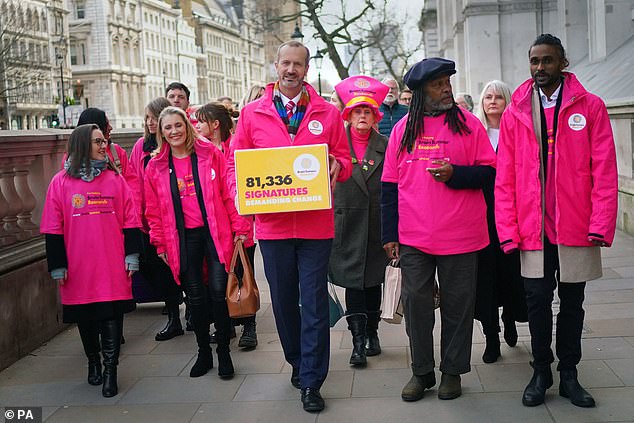The queue of cancer patients waiting more than 60 days for treatment would stretch from London to Cardiff, campaigners say as they march through Parliament
Campaigners say the number of cancer patients waiting too long to start treatment would stretch from London to Cardiff if they were lined up.
Patients, charity activists and oncologists marched on Parliament yesterday to call for urgent action to tackle the cancer crisis.
They unveiled a banner with new analysis showing that more than 200,000 patients have experienced treatment delays since 2020.
Led by #CatchUpWithCancer, they called on ministers to commit to a specific cancer plan to tackle what they called ‘the deepest cancer crisis in 30 years’.
They said tens of thousands of people have missed the 62-day cancer treatment target, and argued that every four weeks of treatment delay could increase the risk of death by 10 percent.
Brain tumor campaigners, (left to right) Antiques Roadshow expert Theo Burrell, TV gardener Danny Clarke, Dan Knowles, CEO of Brain Tumor Research, Sam Suriakumar, a patient undergoing treatment for a brain tumor, and mother of campaigner Laura Nuttall, Nicola Nuttall , posing with their autograph box before handing in a petition at 10 Downing Street, London

Brain tumor campaigners, including Antiques Roadshow expert Theo Burrell and campaigner Laura Nuttall’s mother, Nicola Nuttall, walk along Whitehall on their way to Downing Street

Campaigners said tens of thousands of people have missed the 62-day cancer treatment target, arguing that every four weeks of treatment delay could increase the risk of death by 10 percent.
Providing a regional overview of cancer treatment delays, they said the Midlands was the worst region for delays since January 2020, saying 49,613 people faced unacceptable waiting times.
This was followed by 35,935 in the North East and Yorkshire, 31,503 in the South East, 28,425 in the North West, 27,379 in the East of England, 26,971 in the South West, 22,578 in London and 114 in private treatment.
Oncologist Professor Pat Price, co-founder of the campaign group, said: ‘Let this be the end of accepting the unacceptable when it comes to cancer.
‘We call on all (political) parties to recognize the cancer crisis and commit to a plan to tackle it.’
An NHS England spokesperson said: ‘The NHS has treated more than 1.2 million people for cancer since 2020, and in the last year alone almost three million people received potentially life-saving cancer checks and more than 336,000 people started treatment – with more than 90 percent of patients starting treatment within a month, despite record demand.
‘NHS staff continue to work hard to prioritize the longest waiters and most urgent cases, and recent efforts are ensuring more people are diagnosed early than ever before and survival rates are higher than ever.’

Providing a regional overview of delays in cancer treatment, campaigners said the Midlands was the worst region for delays since January 2020, saying 49,613 people faced unacceptable waiting times.
The march included a petition signed by more than 80,000 people calling for more investment and research into brain cancer.
Antiques Roadshow expert Theo Burrell, who was diagnosed with glioblastoma (GBM) in June 2022, and Danny Clarke of the BBC’s The Instant Gardener, whose sister Margot McLellan died from GBM, joined Brain Tumor Research officials to to submit the petition.
Ms Burrell said: ‘Brain tumors are severely underfunded, they need more investment and we need to raise awareness so we can improve treatment options and ultimately find a cure.
‘We have seen better results in other forms of cancer where more investment is made, such as leukemia and breast cancer.
‘So we have to bring brain tumors on a par with those other types of cancer.’
